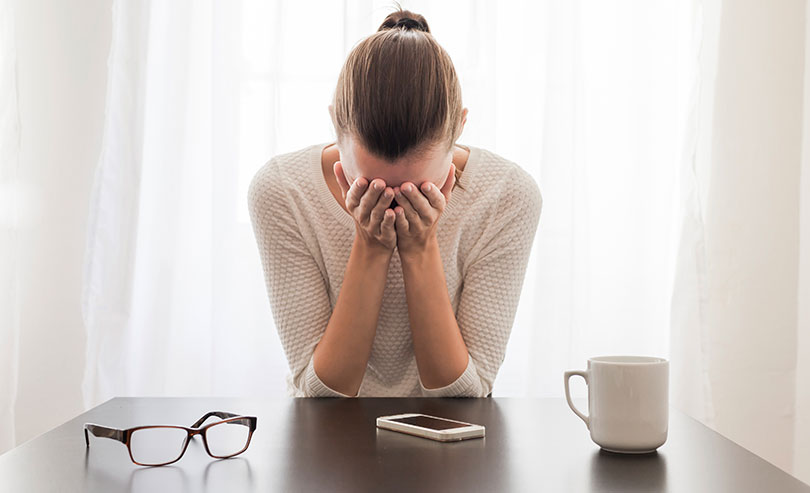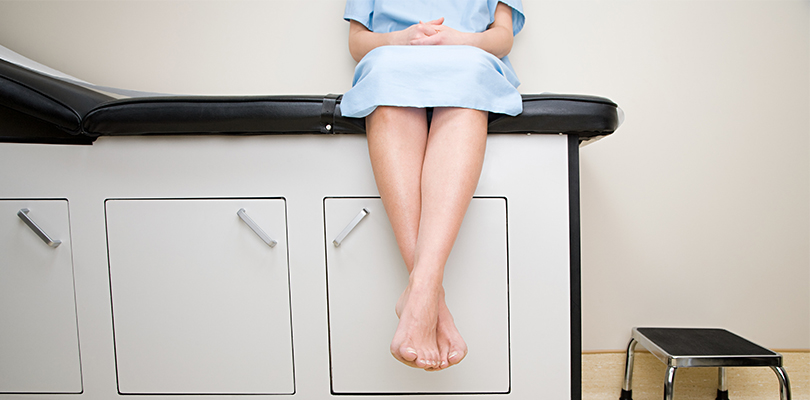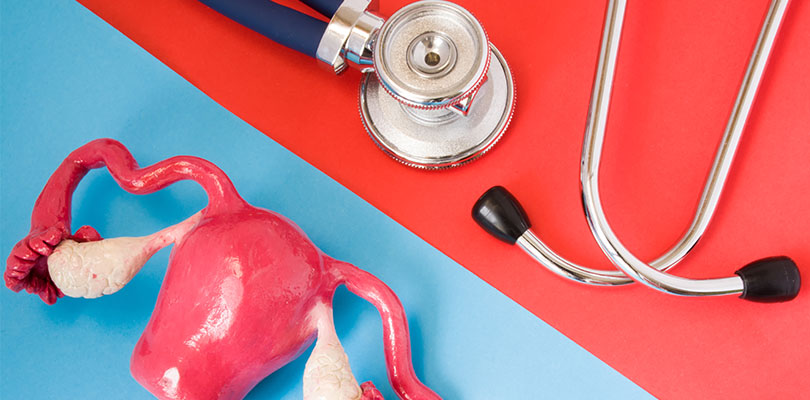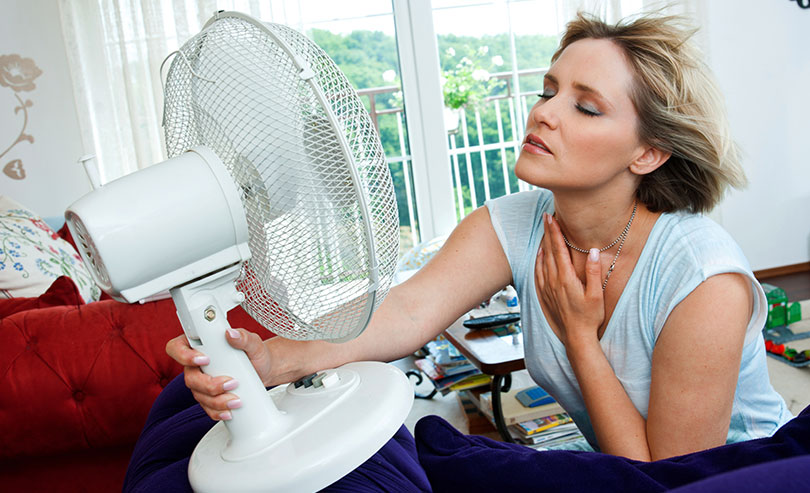Photo Credit: Wavebreakmedia / iStockPhoto.com
Why You're at Risk for Depression, and How to Counteract the Problem
There’s no denying it: as women near the midlife mark, menopause and depression start to climb. Although there’s still some mystery behind the link, factors like a family history of depression, a dip in self-image, and new stressors appear to raise the risk of depression during these transitional years.
However, social and psychological factors are just part of the puzzle. The physical changes you experience on your way to menopause are natural, but they can also upset the fine balance of hormones, neurotransmitters, and other chemicals your body relies upon. Depression may be a mental condition, but it’s definitely not all in your head.
Even if you’ve never suffered from depression before, you might find yourself struggling against the gloom at some point during your menopausal years. Although it can be one of the biggest challenges to your independence and personality, you have the ability to overcome depression before it overwhelms your quality of life.
How Hormones Can Bring on Depression
Since depression can hit quite suddenly around menopause, it seems as though hormones have a big part to play. Indeed, experts point out fluctuating hormone levels can bring about unsavory emotional consequences.
In the years leading up to menopause (the phase known as perimenopause), the body begins to pump out estrogen and progesterone in less predictable doses. This change will interfere with other chemical processes and natural reactions, especially when it comes to the stress and relaxation responses.
Estrogen and Serotonin
Adequate serotonin levels bring better sleep, a more positive outlook, relaxation, and a general sense of wellbeing. When hormones begin to fluctuate in perimenopause, emotions can become more unpredictable; by the time you enter menopause, your emotional health may already be at risk of collapse.
When a woman’s estrogen levels rise, serotonin levels in the brain also rise. Likewise, when estrogen falls, so too does serotonin. Since serotonin is such an important natural mood regulator, helping you stay calm and happy, it follows that too little could cause emotional problems.
Serotonin is also thought to regenerate brain cells, an important process for emotional balance. If new brain cells are not being produced fast enough, your chances of depression increase even more.
Progesterone and Anxiety
Along with estrogen, progesterone is an important hormone for reproductive health and general balance in the body. Progesterone is also a calming hormone, and when it begins to drop sometime after the age of 30 you may begin to notice negative emotional effects.
Without a healthy level of progesterone it’s common to feel easily stressed and overwhelmed. Anxiety symptoms like tension headaches, heart palpitations and panic attacks can follow, and for some women these can lead to a chronic anxiety disorder.
The Domino Effect
A drop in estrogen and progesterone can set off a chain reaction of health issues: lack of hormones leads to sleep loss, hot flashes and mood swings, which combine to create a good deal of physical and emotional stress. That stress can trigger worry, anxiety and more mood swings.
In fact, stress is worse on your hormonal balance than you might imagine. Constant high levels of stress will interfere with serotonin production and encourage your body to release the hormone cortisol in place of other hormones, like calming progesterone.
The result? Stronger, more frequent and more pronounced feelings of depression and anxiety.
Symptoms of Emotional Disorders in Menopause
There are three basic forms of depression: a depressed mood, depression as a symptom of another condition, and clinical depression. The first two are common, normal reactions to the ups and downs of daily life. On the other hand, clinical depression can be traced to a chemical imbalance, and will have disastrous effects unless you manage it promptly and properly.
Experiencing acne after menopause? You may have postmenopausal acne. Learn how to treat and prevent further acne breakouts here.
Menopause could worsen depression (in all its forms), but then again, lots of women move through the transition without too much emotional strain. Before you jump to serious conclusions, or dismiss your sadness as a simple side effect, consider how your symptoms match up with these common symptoms of serious depression:
- Extreme sadness that carries on for days
- Lethargy
- Problems concentrating and remembering
- Insomnia or excessive sleep
- A noticeable change in appetite
- Constant irritability
- Loss of interest in hobbies
- Feelings of deep guilt and worthlessness
Sometimes an emotional disorder manifests as anxiety rather than depression (especially when progesterone deficiency is at the root of the problem). Here are the more prevalent symptoms of anxiety to watch for:
- Impatience
- Unreasonable worry
- Trouble sleeping
- Restlessness
- Feelings of impending doom
- Panic
Panic attacks can bring a surge of energy (an adrenaline rush), then a drastic drop-off, leaving you feeling exhausted, emotional and unmotivated. There are several anxiety disorders, and the way you experience the fear, worry and panic may be different than how someone else describes their anxiety.
Stay in Good Spirits With a Healthy Lifestyle
Luckily, most women who experience depressive episodes in menopause are not clinically depressed. In many cases the problem is with mood swings, and although these can be upsetting and may progress to a more severe form of depression, there are several treatments to try before turning to medication for relief.
Why Exercise Is so Powerful
Long-term exercisers are some of the happiest people on the planet, and there’s science to back up their sunny demeanors. First, exercise releases neurotransmitters that keep you feeling good, like endorphins and endocannabinoids. These can stick around after your workout is done, too, prolonging your positive feelings.
Exercise also increases your body temperature (which can have a calming effect), while reducing inflammation and serving as a powerful distraction from the negative thoughts that might be hanging over your head.
Foods for Happiness
There’s a reason why so many people have such a tough time giving up carbs — they make you feel good! While simple carbohydrates aren’t the best choices (they send your blood sugar soaring), complex carbs like whole grains and fibrous veggies are healthy, plus they keep you calm and balanced.
Omega-3 fatty acids, vitamin D and selenium are other depression-fighting compounds to include in your daily diet. If you’re dealing with mild depression, you may also want to consider adding a supplement like St John’s wort, saffron, or SAMe to boost your mood naturally (and without much risk of side effects).
Stress Management
As you move into middle age, stress can pile on quickly and dangerously. Not only are you dealing with the physical and emotional discomforts of menopause, but you might also be simultaneously caring for children and aging parents, considering a job change, or maybe on the verge of a relationship change.
In any case, women have a habit of placing sky-high expectations on themselves, which can strain the mind and body.
Managing stress can be easier said than done, but it’s important to try your best to take some pressure off yourself. Also, remember that patience is an important virtue; improvements don’t often happen overnight.
With healthy lifestyle changes and more time for relaxation, you can expect your mood to improve gradually, but it could take several weeks before you see significant progression.
When to Seek Professional Help
Feeling blue from time to time is a part of life — no matter which phase of life you happen to be in. However, when a gloomy episode stretches over several days, or you’re experiencing multiple symptoms of depression for two weeks or longer, there could be a deeper chemical imbalance at play. Make it a priority to visit your doctor for further investigation.
If you’re suffering from severe depression, your first move should be to correct your hormone discrepancy. Hormone therapy can be helpful, or if your depressive symptoms are mild enough, the contraceptive pill might be able to level you out. In other cases, antidepressants are prescribed to regain the chemical balance you need for an even, positive mood.
Depression is a complicated illness, and though it’s tempting to take a shortcut to relief, you would be wise to talk with a specialist before adding any extra pharmaceutical element to your menopause management. A psychotherapist specializing in cognitive behavioral therapy (CBT) or interpersonal psychotherapy (IPT) can offer sound advice, and a welcome social connection.







